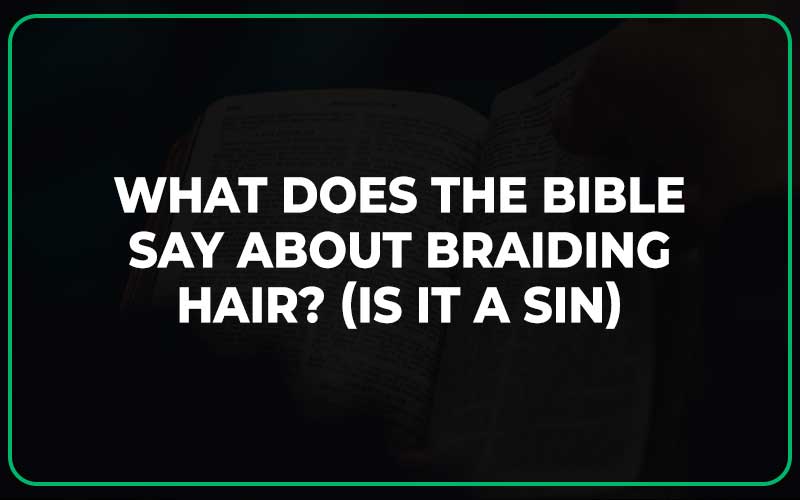In a world where fashion trends evolve faster than the seasons, it’s not uncommon to find Christians expressing their individuality through their hairstyles, even within the sacred walls of the church.
But amidst the sea of braided crowns and intricate hair designs, a pertinent question emerges: “Is braiding hair a sin?” Let’s delve into the Scriptures to unravel the truth behind this intriguing inquiry.
Is Braiding Hair a Sin? Unveiling the Truth
Amid the tapestry of verses and beliefs, the truth about braiding hair and its place in Christianity might not be as black and white as we think. While braiding hair itself is not inherently sinful, the key lies in the intentions that underpin this act. The Bible, often seen as a timeless guide for righteous living, holds subtle hints about this topic.
What Does the Bible Say About Braiding Hair?
The verses in question, namely 1 Timothy 2:9-10 and 1 Peter 3:3-4, serve as intriguing portals into the heart of the matter. But, do they explicitly condemn braiding hair? These verses, when closely examined, seem to carry a deeper message—a message of humility and modesty.
1. 1 Timothy 2:9-10 – Modesty Over Adornment
“Likewise also that women should adorn themselves in respectable apparel, with modesty and self-control, not with braided hair and gold or pearls or costly attire, but with what is proper for women who profess godliness with good works.”
Here, the focus isn’t solely on braided hair, but rather on the modesty and self-control that should guide a Christian’s appearance. Braided hair, often accompanied by opulent jewelry, becomes an emblem of outward extravagance. The Bible underscores the importance of a humble heart over flashy appearances, a recurring theme throughout its teachings.
2. 1 Peter 3:3-4 – The Beauty of the Heart
“Do not let your adorning be external, the braiding of hair and the putting on of gold jewelry, or the clothing you wear but let your adorning be the hidden person of the heart with the imperishable beauty of a gentle and quiet spirit, which in God’s sight is very precious.”
This passage echoes a similar sentiment, stressing that true beauty emanates from the heart’s disposition rather than outward embellishments. Braided hair, once again, serves as a metaphor for fleeting adornment that pales in comparison to the enduring beauty of a humble and gentle spirit. The verses advocate for a focus on inner transformation, mirroring Christ’s teachings.
Also Read: What Does “Out of the Abundance of the Heart the Mouth Speaks” Mean? (Luke 6:45)
Understanding the Historical Context Of Braiding Hair
To truly grasp the significance of these passages, we must journey back to the first-century Roman culture. A culture where ornate hairstyles adorned with jewels and gold were commonplace. Women would intricately braid their hair atop their heads, not just as an expression of fashion, but as a means to garner attention and admiration. In this context, the apostles’ words take on a more profound meaning.
Does Braiding Hair Have Pagan Roots?
It’s worth pondering whether the practice of braiding hair might have originated from pagan cultures. Ancient Egyptians, often associated with paganism, historically adorned themselves with braided hairstyles. Mummies preserved over the centuries have been discovered with intricate braids, suggesting that the practice existed long before Christianity.
However, it’s crucial to remember that practices can evolve and take on new meanings within different contexts. The Bible’s focus remains on the heart and intentions rather than the origins of hair braiding.
Biblical Lessons: Modesty, Humility, and Priorities
Braided hair serves as a symbolic doorway into more profound lessons outlined by the Scriptures. It’s not about whether braiding is inherently sinful, but rather about how our actions reflect our faith.
The True Essence of Beauty
In 1 Peter 3:3-5, we encounter the essence of true beauty. The contrast drawn between outward adornment and the beauty of a “gentle and quiet spirit” reinforces the notion that God values inner character over external aesthetics. The message here is clear: while braided hair may catch the eye, it’s a heart devoted to humility and Christlike virtues that truly captures God’s gaze.
Modesty and Good Deeds
1 Timothy 2:9-10 places emphasis on modesty and good deeds. The passage advocates for adorning oneself with the richness of good character rather than elaborate hairstyles or costly attire. This highlights the ongoing debate surrounding modesty within Christian culture. It’s not the act of grooming itself that’s questioned, but the intention behind it—whether it’s driven by pride or a desire to glorify God.
A Godly Perspective on Presentation
Christianity places immense importance on presenting ourselves as vessels of God’s glory. The body is seen as a temple (1 Corinthians 6:19–20), and this perspective shapes how we present ourselves to the world. It’s a balance between personal expression and spiritual responsibility.
Also Read: Did Jesus Have a Tattoo? (Explained)
Conclusion: Striving for Inner Beauty
In the quest to unravel the enigma of braiding hair in a Christian context, we find that it’s not a sin per se. Rather, it’s a reflection of deeper principles—the value of humility, the supremacy of inner character, and the significance of modesty. The message remains clear: Our appearance should reflect the Christlike qualities we cultivate within our hearts.
So, is braiding hair a sin? The answer rests not in the act itself, but in the intention and attitude we bring to it. In a world that clamors for attention, let us heed the call to emulate the humility and inner beauty that Christ exemplified. Remember, the Bible doesn’t dictate specific hairstyles, but it does guide us towards cultivating a heart that radiates the light of Christ.
References:
What does the Bible say about Braided Hair
Why does the Bible speak against braided hair?

